
Missile displayed during parade
צילום: איי פי
Iran shows off new missile, taunts Israel
Islamic Republic displays long-range Ghadr-1 missile during parade that calls for 'death to America and Israel'; head of Revolutionary Guards says 'enemy will regret any attack on us'
Iran on Saturday showed off a longer-range missile in public for the first time and proclaimed a string of anti-Israel slogans, in a military parade held amid warnings of conflict with the West.
The missile -- labeled Ghadr-1 (Power) -- was said to be in development by Western experts, but its appearance at the annual military parade to mark the start of Iran's 1980-1988 war with Iraq was its first public showing.
The official announcer at the parade told reporters that the weapon had a range of 1,800 kilometers (1,100 miles), sufficient to put US bases in the Middle East and Iran's arch enemy Israel within reach.
"The Iranian nation is ready to bring any oppressive power to its knees," read a slogan from supreme leader Ayatollah Ali Khamenei inscribed on a massive board on a truck.
The head of Iran's elite Revolutionary Guards, Mohammad Jaafari, warned bluntly: "My message to the enemy is that they will regret it (an attack). Do not do it."
The Ghadr missile, which has a "baby bottle" style nose for extra aerodynamic efficiency, is seen as an improved version of Iran's existing longer-range Shahab series, which was also paraded.
Officials have said in the past that the Shahab-3 could reach 2,000 kilometers (1,250 miles), but the announcer said it had a 1,300-kilometre (800-mile) range.
'Special methods and tactics'
The parade was marked by a litany of slogans calling for "Death to America" and "Death to Israel." Western military attaches, apparently warned of this in advance, boycotted the rally for the second year running.
"The Western attaches did not come. It was because of the slogans about Israel and the United States," said one foreign representative who declined to be named.
"Israel should be eliminated" and "No Iranian Muslim, no Muslim recognizes Israel," were among the slogans borne on the back of military vehicles, quoting the words of Iran's revolutionary founder Ayatollah Ruhollah Khomeini.
"Israel has to be wiped off the map," read another Khomeini quote which aroused worldwide controversy when it was repeated by President Mahmoud Ahmadinejad in 2005.
The parade came amid growing tensions over Iran's nuclear program, which the United States alleges is cover for a nuclear weapons drive but which Tehran insists is aimed solely at producing electricity.
French Foreign Minister Bernard Kouchner has warned that the world should brace for war against Tehran if it keeps defying the UN Security Council by pressing on with sensitive nuclear work.
Iran's military, especially its air force, has been hit by the US trade embargo, and General Jaafari admitted that the Islamic republic would need to outsmart its enemies using means other than technology.
"Their material capabilities are better than us, everyone knows it and we admit it. We are responding to technology not with technology but with special methods and tactics," he told reporters.
Officials said that only weapons built by Iran were shown at the parade, in a bid to emphasize the country's self-sufficiency in military technology.
President Mahmoud Ahmadinejad meanwhile said in a speech that warnings of military action and further UN sanctions would have no effect on Tehran's nuclear drive.
"Those who think that with outmoded instruments like psychological warfare and economic sanctions they can stop Iran's march towards progress are making a grave mistake," Ahmadinejad said.
The full panoply of Iran's armed forces were on display, with thousands of goose-stepping members of the regular army and the Revolutionary Guards saluting Ahmadinejad and top military leaders in a march-past.
The United States and its ally Israel have never ruled out using military action against Iran for its defiance in the nuclear standoff.
Iran has said it will never initiate an attack, but has warned of striking US bases in the Arabian peninsula, Iraq and Afghanistan - as well as Israel itself - as a response to any aggression.










